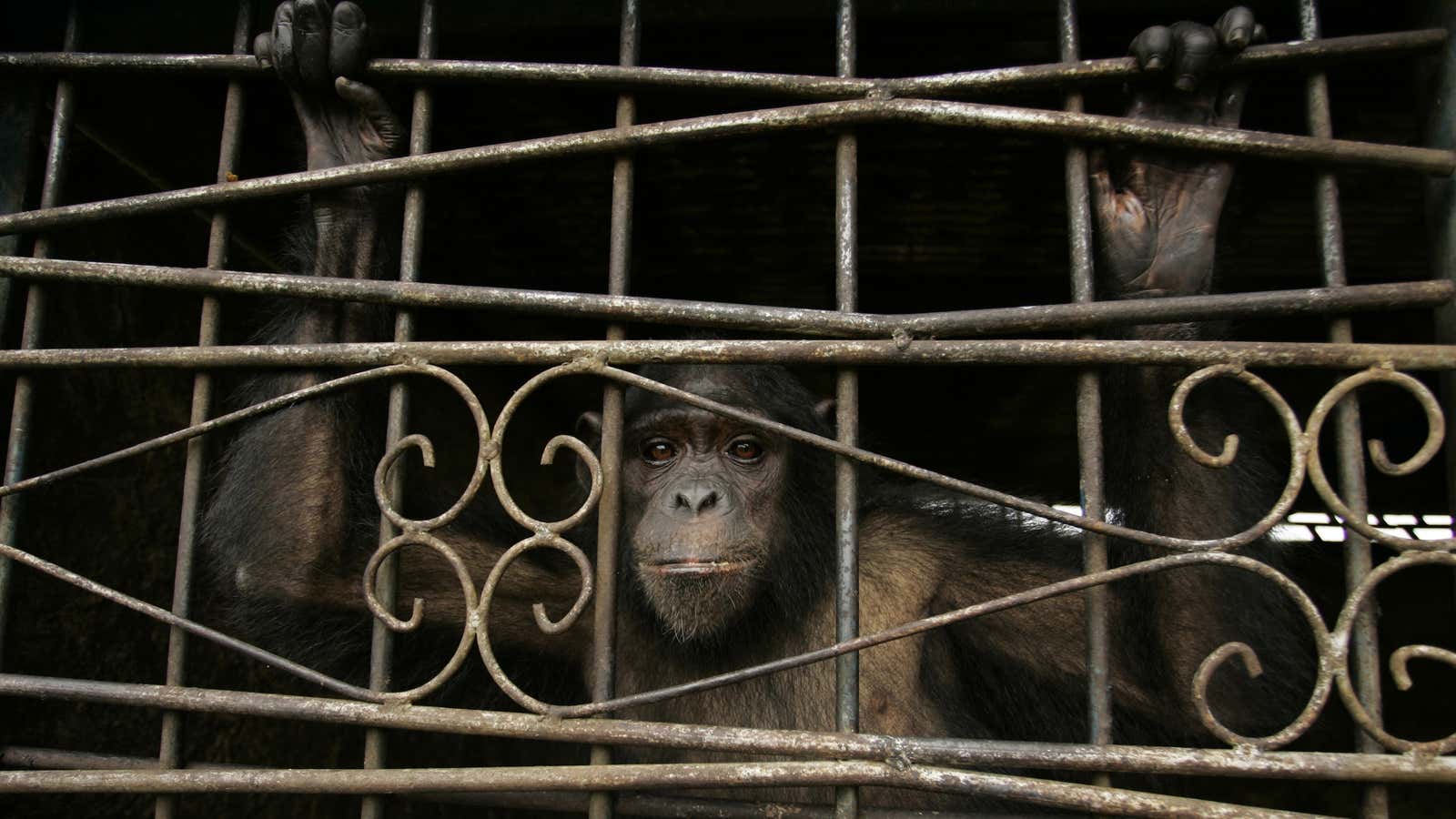This post has been updated.
On Apr. 20, 2015, for the first time in history, two animals received recognition as legal persons under United States law.
Hercules and Leo, two chimpanzees who are currently being held for biomedical experimentation at Stony Brook University in the state of New York, were granted a writ of habeas corpus by Manhattan supreme court justice Barbara Jaffe. A writ of habeas corpus demands that a detainee—in this case, the Hercules and Leo—be taken before a court so that a judge might determine whether the detention is legally valid.
According to a statement published by the Nonhuman Rights Project, which filed a petition for the writ in Mar. 2015, “Under the law of New York state, only a ‘legal person’ may have an order to show cause and writ of habeas corpus issued in his or her behalf. The court has therefore implicitly determined that Hercules and Leo are ‘persons.’”
The writ in question requires Stony Brook University to provide a “legally sufficient reason” for the detention of the two chimpanzees. The court has scheduled that hearing for May 6, 2015. If unable to do so, the Nonhuman Rights Project has requested that the apes be released into the care of Save the Chimps, a non-profit primate sanctuary operating out of Fort Pierce, Florida.
Judge Jaffe’s decision is a watershed moment for the great-ape personhood movement—spearheaded by such notable figures in natural science as Jane Goodall, Richard Dawkins, and Steven Wise (a Harvard law professor and founder of the Nonhuman Rights Project). The movement suffered a serious setback in Dec. 2014, when a New York state appeals court denied personhood to Tommy, a 26-year-old chimpanzee confined to a wire-mesh cage in upstate New York. “In our view, it is this incapability to bear any legal responsibilities and societal duties that renders it inappropriate to confer upon chimpanzees the legal right—such as the fundamental right to liberty protected by the writ of habeas corpus—that have been afforded to human beings,” judge Karen Peters wrote in the official opinion and order.
Update (Apr. 22, 2015, 9:52am): A few hours later, Jaffe amended the order to remove habeas corpus, basically nullifying her earlier decision.
Wise, who filed Tommy’s writ with Elizabeth Stein, an attorney associated with the Nonhuman Rights Project, disagreed: “Chimpanzees are autonomous, self-determining beings. Why shouldn’t they be legal persons?” he told Wired. “How is it that we can ignore the autonomy of a nonhuman, while making [autonomy] to be a supreme value of a human being?” he added.
Though the point of securing habeas corpus for chimpanzees like Tommy, Leo, and Hercules isn’t to provide full human rights for animals, Wise clarified. The effort seeks to obtain recognition for a single right: the right to not be imprisoned against one’s will. In Wise’s mind, Tommy’s case not all that different from those concerning trafficked children: “Tommy is the equivalent of a human child,” he told Wired. “He is a cognitive and extraordinarily complex being.”
Primatological studies conducted over the past two decades back up Wise’s assertions. Research conducted by Japanese primatologists at the Primate Research Institute in Kyoto found that chimpanzees are able to discern “self-agency.” They conducted an experiment in which a chimpanzee-subject placed a finger on a touch-sensitive screen, then used a trackball to move one of two cursors. The second cursor moved in accordance with recorded movements made earlier by the same subject, and were designed to distract. The session ended once the subject passed over a target, or after a certain amount of time. Afterward, the subject had to identify which of the two cursors they had been moving themselves, and received a reward if successful. Of the three adult females tested, all scored above 90%.
”We provide the first behavioral evidence that chimpanzees can perform distinctions between self and other for external events on the basis of a self-monitoring process,” the researchers concluded. “Chimpanzees and humans share fundamental cognitive processes underlying the sense of being an independent agent.” In layman’s terms, chimpanzees are autonomous. And while they may not be genetically human, personhood—if defined by a capacity for autonomy—certainly applies.
Update (Apr. 22, 2015, 9:52am): Though Stony Brook University is not issuing comment at this time, the Nonhuman Rights Project released the following statement after Jaffe’s reversal: “This case is one of a trio of cases that the Nonhuman Rights Project has brought in an attempt to free chimpanzees imprisoned within the state of New York through an ‘Article 70-Habeas Corpus’ proceeding. These cases are novel and this is the first time that an order to show cause has issued. We are grateful for an opportunity to litigate the issue of the freedom of the chimpanzees.”
